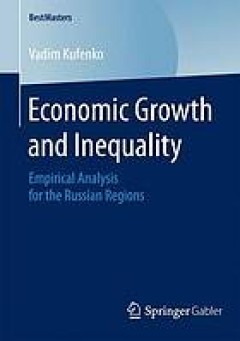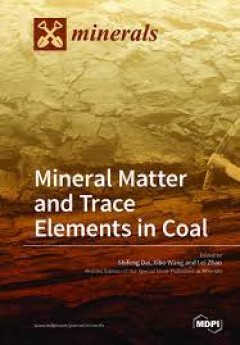Filter by

Economic Growth and Development : a Dynamic Dual Economy Approach
This textbook is an introduction to the newer features of growth theory that are particularly useful in examining the issues of economic development. Growth theory provides a rich and versatile analytical framework through which fundamental questions about economic development can be examined. Structural transformation, in which developing countries transition from traditional production in lar…
- Edition
- -
- ISBN/ISSN
- 9783319897554
- Collation
- x, 356 pages : 26 illustrations
- Series Title
- -
- Call Number
- 338.9

Economic growth and inequality : empirical analysis for the Russian regions
Vadim Kufenko provides a theoretical and empirical analysis of various aspects of economic growth and income inequality in the Russian regions using different estimation techniques from the cross-section OLS and logistic models to dynamic panel data system GMM. The general period for the data is 1995-2012. Acknowledging the crucial role of human capital, the author models the brain-drain using …
- Edition
- -
- ISBN/ISSN
- 9783658080839
- Collation
- -
- Series Title
- -
- Call Number
- 330.9

Economic growth in developing countries : structural transformation, manufact…
Economic growth across countries during the last 30 years or so has displayed 'dual' divergence between developed and developing countries, and among developing countries. The structural transformation has been either slow or of an anomalous nature. The study addresses these and suggests how they can catch-up with developed world
- Edition
- -
- ISBN/ISSN
- 9781137538079
- Collation
- xviii, 263 pages
- Series Title
- -
- Call Number
- 338.9

Economic history of warfare and state formation
This edited volume represents the latest research on intersections of war, state formation, and political economy, i.e., how conflicts have affected short- and long-run development of economies and the formation (or destruction) of states and their political economies. The contributors come from different fields of social and human sciencies, all featuring an interdisciplinary approach to the s…
- Edition
- -
- ISBN/ISSN
- 9789811016059
- Collation
- -
- Series Title
- -
- Call Number
- 330.9

Economic Impacts of Intellectual Property-Conditioned Government Incentives
This book provides new insights into the economic impacts, strategic objectives and legal structures of an emerging branch of government incentives conditioned on meeting intellectual property-related requirements. Despite becoming more common in recent years, such incentives - ranging from patent fee subsidies and patent box tax deductions to inventor remuneration schemes - are still under res…
- Edition
- -
- ISBN/ISSN
- 9789811011191
- Collation
- x, 328 pages 22 illustrations, 18 illustrations in color
- Series Title
- -
- Call Number
- 338.9

Economic Planning and Industrial Policy in the Globalizing Economy: Concepts,…
National economic planning aims at defining strategic economic objectives and priorities for a country and designing longer term policies and institutional frameworks to achieve them. Complemented in some cases by industrial policies, economic planning is a dynamic attempt to change the structure defining parameters and policy mix of an economy. In market based economies ranging from Western Eu…
- Edition
- -
- ISBN/ISSN
- 9783319064741
- Collation
- xxv, 395 pages
- Series Title
- -
- Call Number
- 338.9

Mineral Matter and Trace Elements in Coal
Minerals are very significant components of coal from both academic and practical perspectives. Minerals may react when the coal is burned, either forming an ash residue, or, in many cases, releasing volatile components, or being needed to be removed as slag from the blast furnace during metallurgical processing. Minerals in coal can also be a source of unwanted abrasion, stickiness, corrosion,…
- Edition
- -
- ISBN/ISSN
- ISBN 978‐3‐03842‐623‐3
- Collation
- -
- Series Title
- -
- Call Number
- 553.24 DAI m

Global Business Strategy : A Systems Approach
The greatest dilemma facing the author of a textbook on international business strategy is estimating readers' knowledge of the domain. Should the author assume that the student already comprehends such subjects as international economics, international trade, and international finance? Or should the book deal extensively with these subjects before tackling management issues? After over fif…
- Edition
- -
- ISBN/ISSN
- -
- Collation
- -
- Series Title
- -
- Call Number
- 650 OPE g

Contemporary Bioethics : Islamic Perspective
The present study undertakes to examine biomedical issues as they have emerged in the last three decades. In the Muslim world, as in any part of the globe, advancements in biomedical technology has meant a number of new issues in the medical treatment and procedures that impinge upon Islamic values as taught by the Qur’an and the Sunna (the Tradition of Prophet Muhammad). Our investigations i…
- Edition
- -
- ISBN/ISSN
- 978-3-319-18428-9
- Collation
- XV, 267 halaman
- Series Title
- -
- Call Number
- 174.2 BAR c

Economic sanctions under international law : unilateralism, multilateralism, …
Since the Second World War, States have increasingly relied upon economic sanctions programs, in lieu of military action, to exert pressure and generally to fill the awkward gap between verbal denunciation and action. Whether or not sanctions are effective remains a point of contention among policymakers. Frequently asked questions include whether any legal order constrains the use of sanctions…
- Edition
- -
- ISBN/ISSN
- 9789462650510
- Collation
- -
- Series Title
- -
- Call Number
- 341
 Computer Science, Information & General Works
Computer Science, Information & General Works  Philosophy & Psychology
Philosophy & Psychology  Religion
Religion  Social Sciences
Social Sciences  Language
Language  Pure Science
Pure Science  Applied Sciences
Applied Sciences  Art & Recreation
Art & Recreation  Literature
Literature  History & Geography
History & Geography